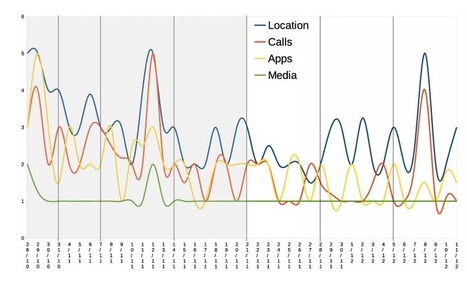Via luiy
Get Started for FREE
Sign up with Facebook Sign up with X
I don't have a Facebook or a X account

 Your new post is loading... Your new post is loading...
 Your new post is loading... Your new post is loading...

luiy's curator insight,
March 12, 2013 4:47 PM
Free trade and free speech: the Internet ideal Facebook text didn’t just arrive on our screens; rather, it echoes key discourses embedded in abstractions offered by other monopoly new media dominating our desktops. It developed, built upon and extended a set of pre–existing structures hardcoded in online globally consumed interfaces, referred to here as “the Web’s commercial interface” (Patelis, 2010). The Web’s commercial interface, of which Facebook is now an integral part, lies at centre stage of the online of experience of a majority of users in the West. Its properties cannot be exhausted within the confines of this paper. Instead we wish to focus on a key component crucial to Facebook: the integration of commerce and communication. The Internet mediates the integration of commerce and communication, unifying and demanding the synchronous development and integration of very dissimilar services and by extension objects. In other words, at the heart of text offered by monopoly new media software, lies the liberal ideal according to which commerce and communication can and should be integrated online, the idea that free speech and free trade are two sides of the same coin and that, by extension, online commerce and online communication are complementary ideals in the democratic capitalist ideal. In representational terms, such integration is so naturalised that a kilo of potatoes for sale and an opinion on paedophilia are literally represented as similar objects across outlets. To quote Bill Gates from 1996:
“Capitalism, demonstrably the greatest of the constructed economic systems, has in the past decade clearly proved its advantages over the alternative systems, As the Internet evolves into its broadband, global interactive network, those advantages will be magnified. Product and service providers will see what buyers want a lot more efficiently than ever before and consumers will buy more efficiently. I think Adam Smith would be pleased.” [2]
We argue that Facebook has been central to the further restructuring and commodification of the media industry around this ideal by establishing further integration of commerce and communication in two ways. Firstly, through the demonization of anonymity and secondly, through the industrialisation of the production of personal data. Coupled with Facebook’s endeavour to colonise the Web, this restructuring has taken centre stage in the development of the media industry recently. Facebook text is key to understanding the broader standardization process of communication on the Web, mainly because it demands user participation in the production process and naturalizes the commodification and industrialisation of personal data. Personalization is a large part of communication in Facebook to the point that personalization — and hence standardization — constitute the product. Thus, individualized information is less important than the fact that information will be archived and ‘pprocessed’, with more personal data produced as a result. This processing allows Facebook to industrialise the production of data. |

luiy's curator insight,
July 10, 2014 5:17 AM
The personal information that your smart phone can collect about you is increasingly detailed. Apps can record your location, your level of exercise, the phone calls that you make and receive, the photographs that you take and who you share them with and so on.
Various studies have shown that this data provides a detailed and comprehensive insight into an individual’s habits and lifestyle, information that advertisers and marketers dearly love to have. Indeed, this information can surprisingly useful. The Google Now smartphone app uses information such as your location to provide details it thinks you might find useful, such as directions home or nearby restaurants.
But this service isn’t entirely altruistic. Google knows perfectly well that it can use this information to sell adverts and other services. That raises an interesting question. If companies such as Google can create a business model based on the use of this kind of personal information, how much is this information worth? And how should we value it when it comes to deciding who should have access to it and who shouldn’t?
Ref: arxiv.org/abs/1407.0566 : Money Walks: A Human-Centric Study on the Economics of Personal Mobile Data |











Like every technology, Big Data has some side effects. Even if you are not concerned about losing your privacy, you should be worried about one thing: discrimination. A typical application of Big Data is to distinguish different kinds of people: terrorists from normal people, good from bad insurance risks, honest tax payers from those who don't declare all income ... You may ask, isn't that a good thing? Maybe on average it is, but what if you are wrongly classified? Have you checked the information collected by the Internet about your name or gone through the list of pictures google stores about you? Even more scary than how much is known about you is the fact that there is quite some information in between which does not fit. So, what if you are stopped by border control, just because you have a similar name as a criminal suspect? If so, you might have been traumatized for quite some time.